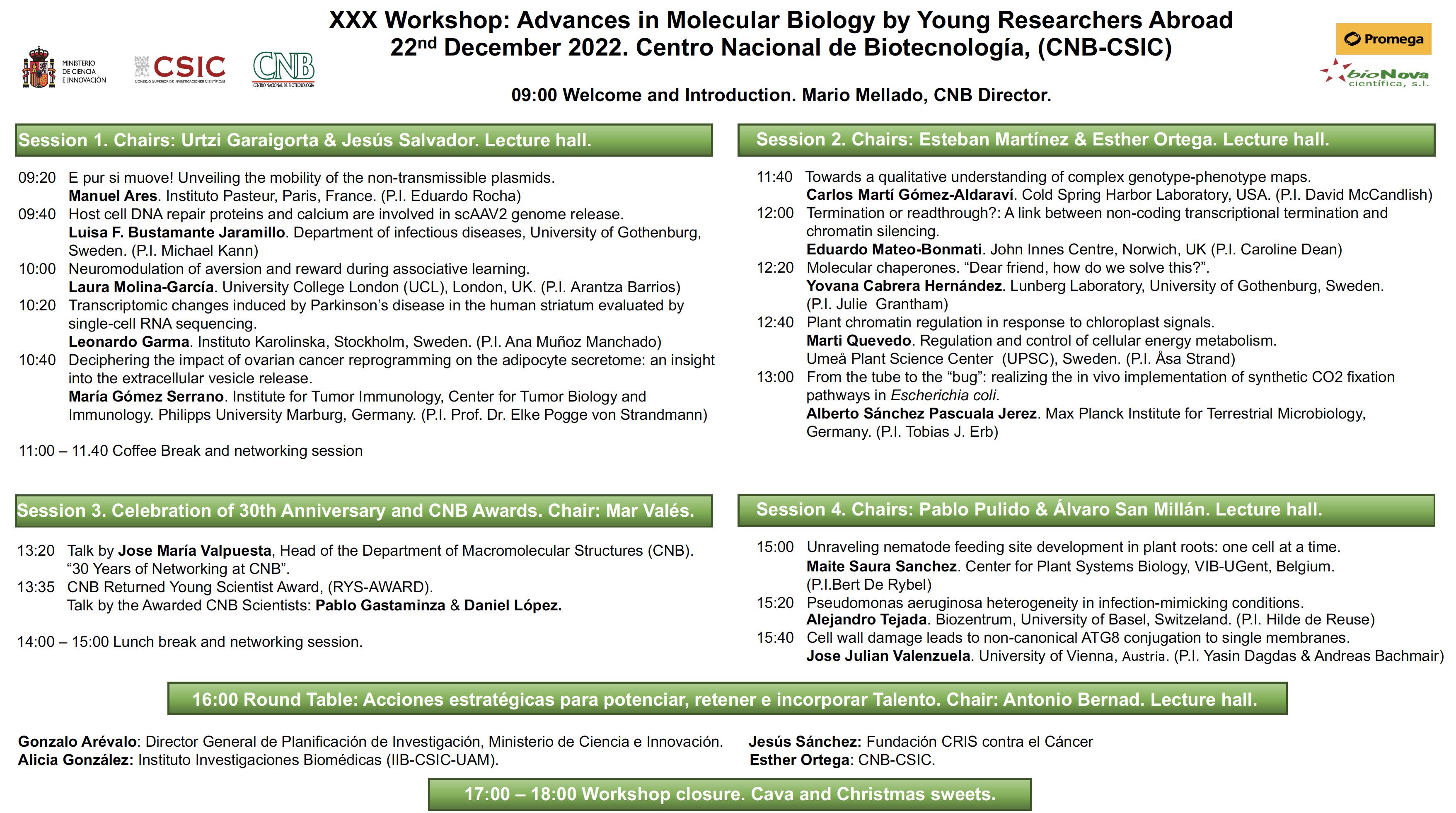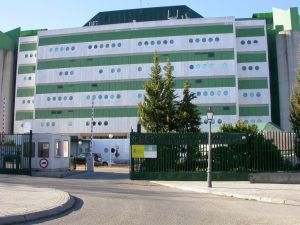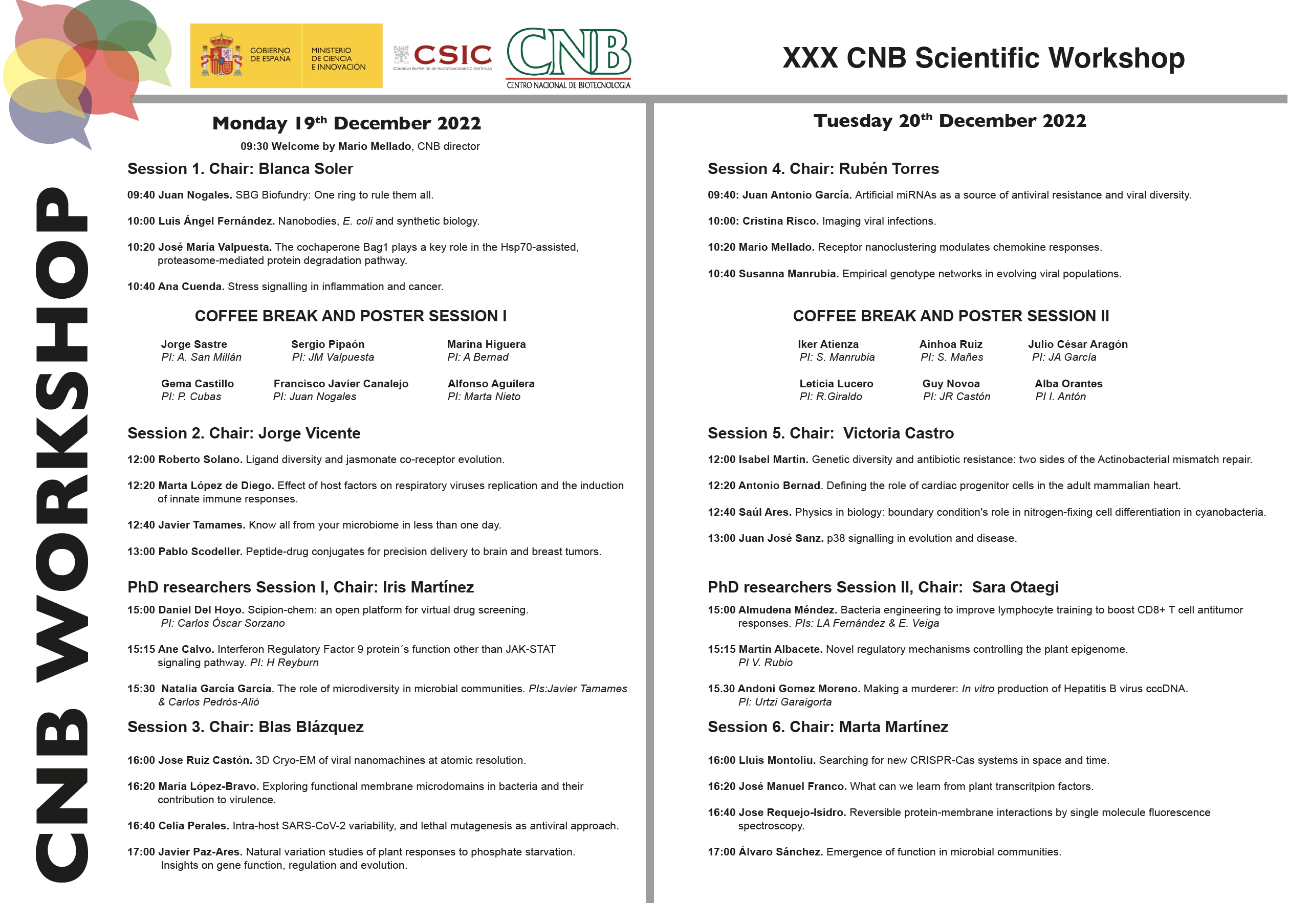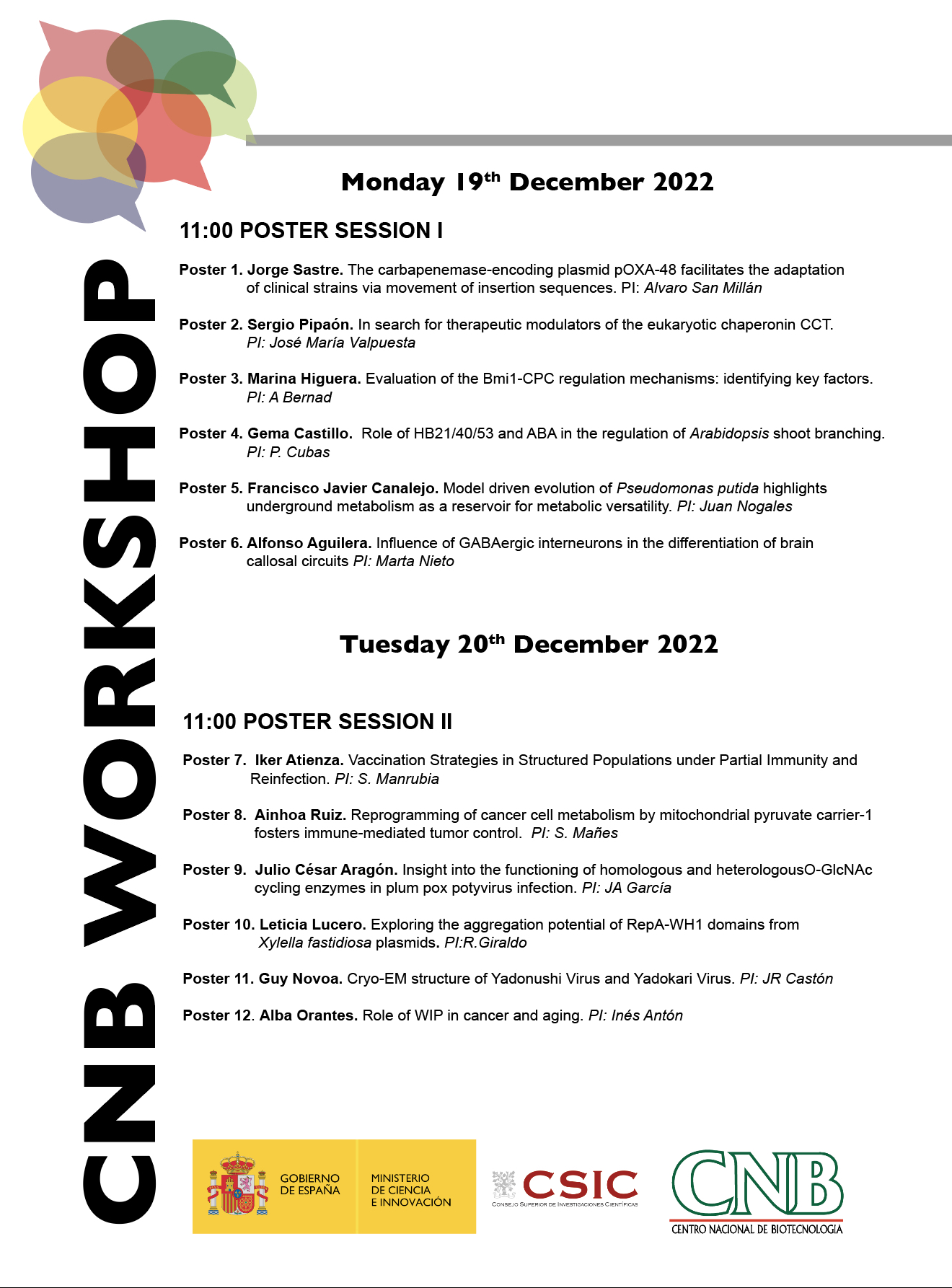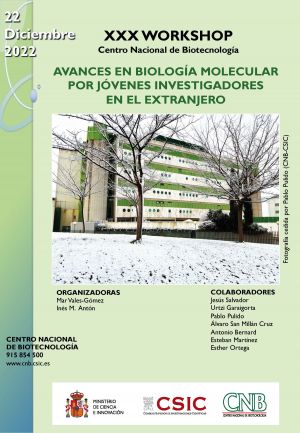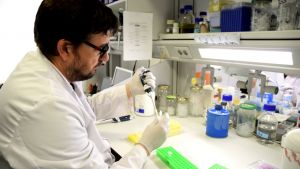
XXX Workshop: Advances in Molecular Biology by Young Researchers Abroad
El CNB recibe el accesit del V Distintivo de Acreditación en Igualdad de Género del CSIC 2022
Estudian cómo evolucionan las bacterias resistentes a los antibióticos en el intestino de pacientes hospitalizados
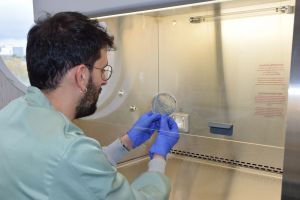
- El trabajo de los científicos del CNB-CSIC evidencia la importancia de integrar la diversidad genética en la vigilancia y diagnóstico de cepas resistentes a antibióticos
Un equipo liderado por científicos del Consejo Superior de Investigaciones Científicas (CSIC) ha analizado cómo evolucionan las bacterias resistentes a los antibióticos en el intestino de pacientes hospitalizados en tiempo real. Los resultados, publicados en la revista Nature Ecology and Evolution, evidencian la importancia de integrar conceptos evolutivos, como la diversidad genética, en los programas de vigilancia y diagnóstico de cepas resistentes a los antibióticos. Asimismo, el estudio pone de manifiesto el impacto de los plásmidos, fragmentos de ADN extracromosómico, en la fisiología de estas bacterias.
Dos investigadores del CNB, en la lista de los científicos más influyentes del mundo
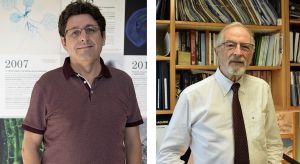
Los investigadores del CNB Jose Manuel Franco-Zorrilla y Luis Enjuanes aparecen en la lista Highly Cited Researchers (HCR) del año 2022, elaborada por la plataforma Webofscience Group, de Clarivate Analytics, que reúne a los científicos más influyentes del mundo.
Esta clasificación reconoce a los casi 7000 investigadores que han contribuido de manera excepcional al conocimiento científico en su área de trabajo gracias a la publicación de numerosos artículos con un alto índice de impacto entre los años 2011 y 2021 y que, además, se encuentran dentro del 1% de los más citados a nivel global. De los 97 científicos españoles incluidos en la lista, 15 pertenecen al Consejo Superior de Investigaciones Científicas.
Alvaro San Millán recibe el Premio de Innovación Científica de la Fundación Pfizer
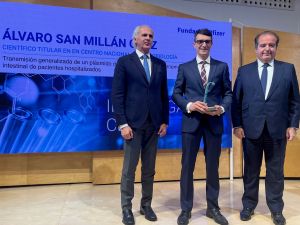
El investigador del CNB Alvaro San Millán ha sido galardonado en la XXIII edición de los Premios de Innovación Científica para jóvenes investigadores de la Fundación Pfizer en la categoría de investigación clínica por su estudio de la resistencia bacteriana en el intestino de pacientes hospitalizados que se publicó en Nature Microbiology.
En el artículo "Permassive transmission of a carbopenem resistance plasmid in the gut microbiota of hospitalized patients" los investigadores han realizado la caracterización epidemiológica y genética de las bacterias intrahospitalarias que transmiten nuevas resistencias frente a antibióticos. Sus resultados apuntan a la importancia de los plásmidos en la diseminación de mecanismos y genes de resistencia a antibióticos de nueva generación que se utilizan en entornos hospitalarios entre las enterobacterias. Estas infecciones constituyen una de las principales amenazas para los pacientes hospitalizados, especialmente en las unidades de cuidados intensivos (UCIs), donde los pacientes ancianos e inmunodeprimidos son sometidos a procedimientos invasivos, que facilitan la colonización bacteriana.
XXX Workshop "Advances in Molecular Biology by Young Researchers Abroad"
Identificado un nuevo mecanismo de diferenciación celular relacionado con la metástasis de cáncer de pulmón
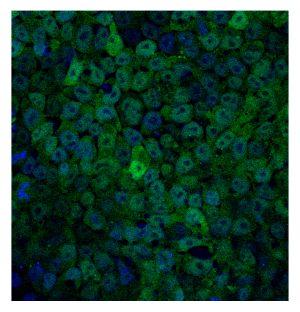
- Investigadores del CSIC han analizado el papel de una proteína relacionada con estados tumorales avanzados en el proceso de transición de células madre a células diferenciadas
- La modulación de los niveles de esta enzima puede ser clave para dirigir de manera controlada la diferenciación celular, fundamental en la aplicación de medicina regenerativa
Investigadores del Consejo Superior de Investigaciones Científicas (CSIC) han liderado un estudio que apunta a las alteraciones de una proteína en las células madre implicadas en la metástasis del cáncer de pulmón. El trabajo, publicado en Stem Cell Reports, ha analizado las alteraciones de la proteína PI3K durante el mecanismo de diferenciación de células madre embrionarias, que pueden dar origen a cualquier otra célula del organismo. La modulación de los niveles de PI3K puede ser clave para dirigir de manera controlada la diferenciación celular, una técnica muy valiosa en la medicina regenerativa.
Los investigadores han explorado el mecanismo que gobierna la transición de las células madre embrionarias hacia células diferenciadas mediante la inhibición o la depleción de PI3K. “Si el proceso de diferenciación es alterado, las células resultantes pueden verse dañadas y dar lugar a varias patologías. Las alteraciones relacionadas con PI3K se asocian con cáncer, trastornos alérgicos, inflamatorios y cardiopatías. Dado su potencial terapéutico, se estudian diversas estrategias para bloquear estas enzimas”, explica Ana Clara Carrera, investigadora del Centro Nacional de Biotecnología del CSIC (CNB-CSIC)) y líder del estudio.
Los investigadores observaron la mutación, actividad y niveles de PI3K en dos líneas celulares de cáncer de pulmón. “Dado que la presencia de esta enzima aumenta en estadios tumorales avanzados, PI3K puede estar implicada en el mantenimiento del fenotipo de las células madre del cáncer, las células que inician la metástasis”, indica Carrera.
PI3K en la diferenciación celular
Un paso crítico en el desarrollo del embrión de mamífero es la formación de las tres capas celulares embrionarias (exterior, media e interior), a partir de las cuales evolucionan los diferentes tejidos humanos. Las capas media e interior se forman en un pliegue que se llama la línea primitiva. “Para mantener el estado de pluripotencia, las células madre embrionarias deben frenar la expresión de los genes de diferenciación y es en esta función donde las PI3K tienen un papel relevante. Sin embargo, también para la diferenciación de las células de las capas media e interior, son necesarias las PI3K” describe Sudhanshu Yadav, primer autor del trabajo e investigador postdoctoral en el CNB-CSIC.
“Lo más llamativo de los resultados es que parece existir un equilibrio bien ajustado entre las diferentes acciones de estas proteínas. Por un lado, la función catalítica de las PI3K es necesaria para mantener el estado pluripotente de las células madre humanas. Por otro, la función de andamiaje de PI3Kbeta contribuye al mantenimiento de la pluripotencia, pero también es necesaria para que las células madre sigan sus vías de diferenciación intrínsecas para formar las capas media e interior”, destaca Carrera. Si podemos modular este equilibrio, seríamos capaces de dirigir la diferenciación de las células madre, con un alto impacto en la medicina regenerativa.
Referencia
Sudhanshu Yadav, Antonio Garrido, M. Carmen Hernández, Juan C. Oliveros, Vicente Pérez-García, Mario F. Fraga, and Ana C. Carrera. PI3Kβ-regulated β-Catenin mediates EZH2 removal from promoters controlling primed human ESC stemness and primitive streak gene expression. Stem Cell Reports 2022, DOI: https://doi.org/10.1016/j.stemcr.2022.09.003
CNB-CSIC y CSIC comunicación
Biofábricas microbianas para producir compuestos naturales aplicables en medicina, cosmética y alimentación
La Fundación Jesús Serra presenta los ganadores del nuevo programa de becas a la investigación en el CNB
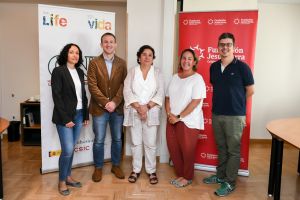
- Fundación Jesús Serra de Grupo Catalana Occidente continua con su apoyo a la investigación financiando, mediante becas, varios proyectos científicos en el Centro Nacional de Biotecnología (CNB-CSIC)
- Cinco jóvenes investigadores e investigadoras reciben cuatro bolsas de ayudas y un contrato para la realización de su tesis doctoral en el CNB
Fundación Jesús Serra de Grupo Catalana Occidente continua con su apoyo a la investigación con una nueva colaboración con el Centro Nacional de Biotecnología (CNB-CSIC). La primera convocatoria de ayudas a la investigación dirigidas a investigadores jóvenes ya tiene ganadores, que han sido anunciados tras la reunión el comité evaluador en la sede del CNB-CSIC en Madrid. El éxito de la convocatoria se refleja en la cantidad y calidad de las propuestas recibidas, a la que se han presentado seis solicitudes de ayudas a la investigación, con una dotación de 15.000 euros cada una para cuatro grupos emergentes del CNB-CSIC y 20 solicitudes para la realización de la tesis doctoral en un proyecto dirigido por investigadores del CNB-CSIC mediante un contrato de cuatro años y una dotación extra de 6.000 euros para gastos de formación durante este tiempo.
La ayuda dirigida a financiar la realización de una tesis doctoral en grupos del CNB-CSIC ha recaído en la investigadora del departamento de Inmunología y Oncología Yolanda Rodríguez Carrasco, cuyo grupo de investigación trabaja en el estudio de las redes de señalización celular que rigen el comportamiento y activación de los linfocitos B.
Por otro lado, las cuatro bolsas de ayuda destinadas a la financiación de grupos emergentes del centro han sido adjudicadas a los jóvenes investigadores Juana Antonia Ávila-Flores, James Pelletier, Luis F. Seoane y Adrián Valli. La trayectoria y los novedosos proyectos de estos cuatro científicos reflejan el carácter multidisciplinar de las investigaciones que se realizan en el CNB-CSIC, que abordan el estudio de temas con un alto impacto en la sociedad como la agricultura, la salud y el medio ambiente.
COOKIES POLICY
A cookie is a text file that is stored on your computer or mobile device via a web server and only that server will be able to retrieve or read the contents of the cookie and allow the Web site remember browser preferences and navigate efficiently. Cookies make the interaction between the user and the website faster and easier.
General information
This Website uses cookies. Cookies are small text files generated by the web pages you visit, which contain the session data that can be useful later in the website. In this way this Web remembers information about your visit, which can facilitate your next visit and make the website more useful.
How do cookies?
Cookies can only store text, usually always anonymous and encrypted. No personal information is ever stored in a cookie, or can be associated with identified or identifiable person.
The data allow this website to keep your information between the pages, and also to discuss how to interact with the website. Cookies are safe because they can only store information that is put there by the browser, which is information the user entered in the browser or included in the page request. You can not run the code and can not be used to access your computer. If a website encrypts cookie data, only the website can read the information.
What types of cookies used?
The cookies used by this website can be distinguished by the following criteria:
1. Types of cookies as the entity that manages:
Depending on who the entity operating the computer or domain where cookies are sent and treat the data obtained, we can distinguish:
- Own cookies: are those that are sent to the user's terminal equipment from a computer or domain managed by the editor itself and from which provides the service requested by the user.
- Third party cookies: these are those that are sent to the user's terminal equipment from a machine or domain that is not managed by the publisher, but by another entity data is obtained through cookies.
In the event that the cookies are installed from a computer or domain managed by the editor itself but the information collected by these is managed by a third party can not be considered as party cookies.
2. Types of cookies as the length of time that remain active:
Depending on the length of time that remain active in the terminal equipment can be distinguished:
- Session cookies: cookies are a type designed to collect and store data while the user accesses a web page. Are usually used to store information that only worth preserving for the service requested by the user at any one time (eg a list of products purchased).
- Persistent cookies: cookies are a type of data which are stored in the terminal and can be accessed and treated for a period defined by the head of the cookie, and can range from a few minutes to several years.
3. Cookies types according to their purpose:
Depending on the purpose for which the data are processed through cookies, we can distinguish between:
- Technical cookies: these are those that allow the user to navigate through a web page or application platform and the use of different options or services it exist as, for example, control traffic and data communication, identify the session, access to restricted access parts, remember the elements of an order, make the buying process an order, make an application for registration or participation in an event, use security features while browsing store content for dissemination videos or sound or share content via social networks.
- Customization cookies: these are those that allow the user to access the service with some general characteristics based on a predefined set of criteria in the user terminal would eg language, the type of browser through which you access the service, the locale from which you access the service, etc.
- Analysis cookies: they are those that allow the responsible for them, monitoring and analyzing the behavior of users of the web sites that are linked. The information gathered through such cookies are used in measuring the activity of web sites, application or platform and for the profiling of user navigation of such sites, applications and platforms, in order to make improvements function data analysis how users use the service.
Management tool cookies
This Website uses Google Analytics.
Google Analytics is a free tool from Google that primarily allows website owners know how users interact with your website. Also, enable cookies in the domain of the site in which you are and uses a set of cookies called "__utma" and "__utmz" to collect information anonymously and reporting of website trends without identifying individual users..
For statistics of use of this website use cookies in order to know the level of recurrence of our visitors and more interesting content. This way we can concentrate our efforts on improving the most visited areas and make the user more easily find what they are looking for. On this site you can use the information from your visit for statistical evaluations and calculations anonymous data and to ensure the continuity of service or to make improvements to their websites. For more details, see the link below privacy policy [http://www.google.com/intl/en/policies/privacy/]
How to manage cookies on your computer: disabling and deleting cookies
All Internet browsers allow you to limit the behavior of a cookie or disable cookies within settings or browser settings. The steps for doing so are different for each browser, you can find instructions in the help menu of your browser.
If you decline the use of cookies, since it is possible thanks to the preferences menu of your browser or settings, reject, this website will continue to function properly without the use of the same.
Can you allow, block or delete cookies installed on your computer by setting your browser options installed on your computer:
- For more information about Internet Explorer click here.
- For more information on Chrome click here.
- For more information about Safari click here.
- For more information about Firefox click here.
Through your browser, you can also view the cookies that are on your computer, and delete them as you see fit. Cookies are text files, you can open and read the contents. The data within them is almost always encrypted with a numeric key corresponding to an Internet session so often has no meaning beyond the website who wrote it.
Informed consent
The use of this website on the other hand, implies that you paid your specific consent to the use of cookies, on the terms and conditions provided in this Cookies Policy, without prejudice to the measures of deactivation and removal of cookies that you can take, and mentioned in the previous section.

